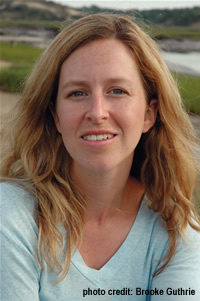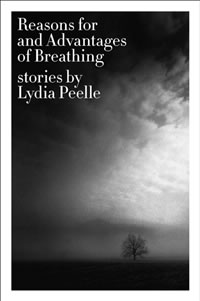It was clear from the beginning that Lydia Peelle’s debut story collection, Reasons for and Advantages of Breathing, was something special. Though small—it contained only eight stories—and published in paperback, it immediately caught the eye of critics. The San Francisco Chronicle praised her “gorgeously crafted stories”, and The Boston Globe highlighted her “sharply etched fictions.” “Lydia Peelle’s lovely, fluid voice lures you into a world full of heartbreak and devastation,” wrote Maria Russo in The New York Times Book Review, noting that it “calls to mind masters of the unsettling short story like Mary Gaitskill, or even Alice Munro.” Peelle has won two Pushcart Prizes and an O. Henry Award; twice she has been included in Best New American Voices. No wonder, then, that the National Book Foundation named her to its 2009 list of the best “5 Under 35” writers, or that in March she was short-listed for the PEN/Hemingway award.
 Last night, the Nashville resident and former Bredesen speechwriter won a coveted Whiting Writers’ Award, which carries a prize of $50,000. These awards have been given annually since 1985 and have honored such writers as Michael Cunningham, Jeffrey Eugenides, Mary Karr, Suzan-Lori Parks, and Tobias Wolff. The Whiting committee lauded Peelle’s “beautiful prose, gorgeous sentences, flawless ear” in Reasons for and Advantages of Breathing: “These are very dark stories; her vision is severe. While she never confronts it didactically, her sorrow about what we are doing to ourselves and to our planet is overwhelming. The scope of her vision takes in a great sweep of life in the present, but is also steeped in a very present sense of history, of how impossible it is to escape the fated paths laid down by people we never knew, as well as by our own younger selves in our inevitable ignorance. These stories—while working perfectly as short stories—suggest the kind of epic vision usually found in novels.”
Last night, the Nashville resident and former Bredesen speechwriter won a coveted Whiting Writers’ Award, which carries a prize of $50,000. These awards have been given annually since 1985 and have honored such writers as Michael Cunningham, Jeffrey Eugenides, Mary Karr, Suzan-Lori Parks, and Tobias Wolff. The Whiting committee lauded Peelle’s “beautiful prose, gorgeous sentences, flawless ear” in Reasons for and Advantages of Breathing: “These are very dark stories; her vision is severe. While she never confronts it didactically, her sorrow about what we are doing to ourselves and to our planet is overwhelming. The scope of her vision takes in a great sweep of life in the present, but is also steeped in a very present sense of history, of how impossible it is to escape the fated paths laid down by people we never knew, as well as by our own younger selves in our inevitable ignorance. These stories—while working perfectly as short stories—suggest the kind of epic vision usually found in novels.”
Lydia Peelle answered a few questions from Chapter 16 by email shortly after learning about the Whiting award.
Chapter 16: Reasons for and Advantages of Breathing has received an immense amount of praise and attention—an almost unprecedented amount of praise and attention—for a short-story collection. I’m sure all writers must secretly dream of making this kind of splash with a first book, but did anyone (teachers, editors, fellow writers) ever give you any reason to think this kind of attention would truly be coming your way?
Peelle: It’s a funny thing about short stories. You hear so much about how the short story is dead, but everywhere you look, there are amazing, fresh, absolutely alive short stories being written, published, and yes, even read. It recalls the whole bit about the theater—I was recently reading a newspaper article published ninety years ago that was lamenting the death of the theater. A few generations later we’re still saying the same thing. I imagine it will be the same with paper books, as it is with vinyl records—on the one hand you have all these voices crying doom and extinction, while meanwhile all these other folks are very happily keeping the thing alive, enjoying it. As for my own experience as a writer of short fiction, no one ever discouraged me from writing a book of short stories, and I’m happy for that.
Chapter 16: Last year at this time you were named one of the National Book Foundation’s “5 Under 35” writers, and last spring you were short-listed for the PEN/Hemingway award. Did those awards change anything about the way you work, or the way you think about your work? Will this prize cause any new changes, do you think?
 Peelle: More than anything, an award like this—any award—makes me want to sit down at my desk and get to work. For me, it’s all about the work to come—the next book.
Peelle: More than anything, an award like this—any award—makes me want to sit down at my desk and get to work. For me, it’s all about the work to come—the next book.
Chapter 16: You’ve talked a lot in interviews—in The New York Times and in BOMB magazine, for example—about the way being an outsider made it possible for you to see Southern people and Southern landscapes freshly, almost with new eyes, in a way that wasn’t possible for you when you tried to write about your native New England. In what ways, if at all, have you begun to feel like a true Southerner since you moved to Tennessee?
Peelle: I can’t say that I feel any more that I belong here than when I arrived ten years ago. That said, writing about Tennessee has made me love it more, for all that is incredible about it and all that is downright bewildering about it—and feeling that way, though not making it home, does make me happy to return every time I go away. I do feel that so much of Tennessee’s story is about the people who come here from away and make it home rather quickly—out of necessity—whether in the year 1799, or 1865, or 2010. Most of my characters are people who have done just that.
Chapter 16: Writing is such a solitary pursuit. Especially now that we’re in the throes of a contentious election season, do you ever find yourself missing your speechwriting days?
Peelle: It is a solitary pursuit. And it can be hard to remember, sometimes, that there’s anyone out there on the other end—it can sometimes feel like talking to oneself in the dark of night. But I try to remind myself that it is in fact a conversation—just a delayed conversation. That, though it can be a lonely process, in the end, it is all about community, about connecting with other human beings.
I do miss speechwriting, and working with good people on a day-to-day level, though I can’t say the contentious election season has anything to do with that—I’m perfectly happy to be on the sidelines for the time being.
Chapter 16: The last time Chapter 16 spoke with you, you’d just begun work on a novel but weren’t ready to talk about it at all. Is there anything about the book you feel comfortable telling us now?
Peelle: It’s set in Tennessee, during the first world war. I’ve been spending a lot of time at the library, reading old Nashville Banners from those years—which is so much fun it doesn’t feel like work at all. Here’s a headline I found last week: “Civil War Veteran and Rattlesnake Found Dead Side by Side in Bristol.” How great is that? It’s gotten so that I read more news from 1916 than from 2010. So it’s probably a good thing I’m not writing speeches these days.
Tagged: Fiction





